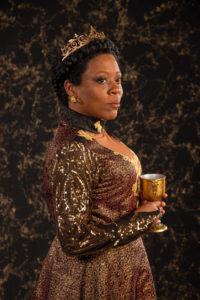CEDAR CITY — King Lear is one of Shakespeare‘s most profound tragedies. Suffering pervades the story, and even the few characters who survive experience great hardship. Ironically, the Utah Shakespeare Festival’s production of King Lear becomes more enjoyable and worthwhile as the characters suffer more.

In King Lear, the title character chooses to abdicate the throne in his old age and divide his kingdom into three parts as his daughters’ inheritance. First, they must pledge their love to him to show that the deserve a portion of his kingdom. The first two, Goneril and Regan, do so, but the third (Cordelia) simply states that she has no words to express her love properly. Enraged, Lear disinherits Cordelia and sends her away. Shortly after, Goneril and Regan show their true colors and treat Lear poorly to the point where he refuses to live with either one. Powerless and disrespected, Lear wonders the countryside and becomes mad. Meanwhile, the Duke of Gloucester is dealing with his own inheritance problems when his younger, bastard son Edmund schemes to obtain his father’s title and wealth by displacing his older, legitimate brother Edgar.

Director Vincent J. Cardinal emphasized Lear’s decisions as contributing to his misfortunes. When Lear finally recognizes this and states, “Forgive and forget. I am old and foolish,” it is a poignant moment because of the flaws that Cardinal allowed Lear to have. The lesson is clear: no one is too old or too powerful to make foolish decisions. I am thankful to finally see a King Lear that makes Lear an agent in his own downfall and allows the character to serve as a cautionary tale for the audience. Cardinal has made the play more than a parade of misfortunes visited upon Lear and Gloucester.
King Lear needs more than an astute director, though. It needs a leading actor who can vividly portray a man experiencing the depths of humiliation and regret. Anthony Heald is that actor. In the first scene, he practically spits to Lear’s faithful daughter Cordelia, “Hast not been born than not t’ have pleased me better.” After robbing the character of all sympathy, Heald then builds it up, line by line, scene by scene until his Lear is so pathetic, debased, and regretful that I felt compelled to feel sorry for the character. The only drawback to Heald’s performance was his muffled diction in some scenes, which inhibited understanding.
Philip Orazio steals the show as Edmund. In each of his soliloquies, Orazio has a tremendous command of the stage, and his character’s disdain for respectable society is apparent in his sarcastic line delivery and indignant attitude. Thanks to the short doublet and tight black trousers that costume designer Michiko Kitayama Skinner created, Orazio has a sex appeal that makes it easy see why Goneril (played by Lisa Strum) would be attracted to him. Stum and Orazio are well matched because Strum’s cool, calculating demeanor made Goneril into a woman who used her charms and intelligence to harm those around her (especially Lear and Goneril’s husband, the Duke of Albany). Her seductiveness and mischievous smile only added to the evil. Also worth mentioning is Stephanie Lambourn as Regan, who matched the other antagonists in villainy. Her primeval shouts during the eye gouging scene and her spitefulness towards many of the male characters magnified the cruelty that pervades the play.

I need to talk about understudies. Due to COVID-19 cases among the Utah Shakespeare Festival’s actors, I saw at least one understudy in almost every play I reviewed this week. In King Lear, I saw three understudies: Nicholas Denhalter (in the role of the Duke of Cornwall), Braedon Young (in the roles of the herald, the Duke of Burgundy, and Curan), and Brandon Zicker (in the roles of the King of France and a Captain). Denhalter was relentlessly cruel in the eye gouging scene and was born to carry a sword. Young (whom I also saw as an understudy in a perfect performance of Trouble in Mind) differentiated his characters well and made the Duke of Burgundy a distasteful person in his brief appearance. As the King of France, Zicker eloquently speaks Shakespeare’s poetry, and the character appears to have genuine affection for Cordelia.
I can think of nothing more terrifying in the theatre world than performing as an understudying on opening night in a Shakespeare play. Yet, Denhalter, Young, and Zicker equaled or exceeded the performances of the regular cast members on stage with them. Understudies have been the heroes of the theatre world during the COVID-19 pandemic, as Utah audiences have seen elsewhere. I applaud the understudies of King Lear and everyone else at the Shakespeare Festival who steps in for a colleague.
Skinner’s costume designs are sumptuous for Lear (in the beginning), his daughters, the courtiers, and soldiers. The shiny fabrics, patterned cloth, fur trim, and jewelry were eye popping in their luxury. The lavish costumes made it easy for Cardinal to create gorgeous stage pictures. Costuming was also used to show when Lear had hit his lowest point. Skinner dressed the character in a just a plain white knee-length tunic. The simplicity of the clothing, coupled with his bare feet and dirtied legs showed how far the king had fallen and made him a pathetic figure worthy of pity.
The only technical aspect of the show that did not work was the “hovel” in Act III, which rose from the trap door at downstage center. The hovel was triangular in form, though wide enough to span the length of the trap door, and only about two feet high. One actor did enter it from upstage and descend through the trap door, but it was an odd stage piece (perhaps designed by scenic designer Linda Buchanan?) that did not look like a shelter at all. Luckily, it was only used in a single scene.
Life is not a picnic for the characters in King Lear. Misery, madness, death, loneliness, pain, and societal chaos drive the plot. The play is a downer, but like all great tragedies, the characters’ sadness drives King Lear to greatness. The Utah Shakespeare Festival has a successful production that is the most satisfying version of King Lear that I have seen, and I recommend it without hesitation.
[box]The Utah Shakespeare Festival production of King Lear plays various dates at 8 PM through September 10 at the Engelstad Shakespeare Theatre on the campus of Southern Utah University. Tickets are $24-84. For more information, visit bard.org.[/box]

